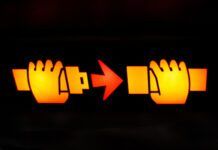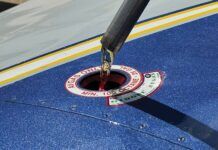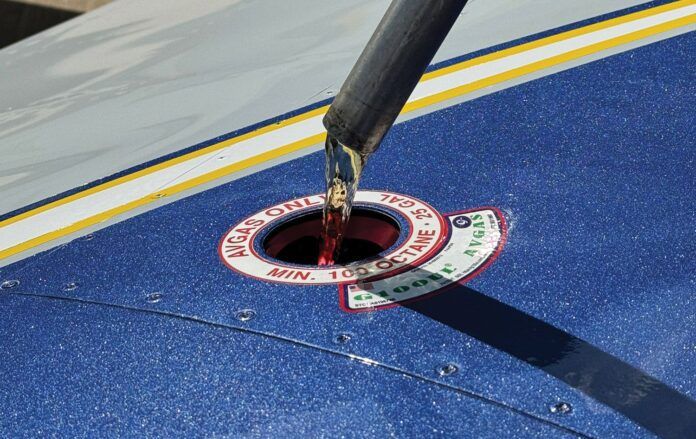A reader who is a lawyer for a large eastern firm has offered a legal opinion on the warranty implications of the use of GAMI G100UL unleaded fuel in Lycoming and Continental engines. Last week Cirrus issued a service advisory that said it did not approve the use of G100UL in its SR series aircraft because its compatibility with materials used in the fuel systems was “inconclusive.” It also suggested the use of the fuel could void the warranties on the engines. “As the GAMI G100UL fuel is a non-approved fuel per Continental and Lycoming, engines known to have run this fuel may not be covered by the current OEM engine warranty,” the service advisory said.
In response to our story on the subject, the lawyer, the owner of a high-performance piston single, is disputing that claim and explains his opinion in the unedited statement copied below. We have confirmed his identity and granted his request for anonymity. We have sent the statement to both Lycoming and Continental. Lycoming has not responded. Continental has confirmed receipt of the statement but is declining comment while it reviews it. Unedited statement from the lawyer follows.
G100UL ® Avgas: Does Its Use Void A Continental or Lycoming Engine Warranty?
“On September 1st , 2022, General Aviation Modifications, Inc. (GAMI) was granted an Approved Model List (AML) Supplemental Type Certificate (STC) by the FAA for its G100UL aviation fuel product for use in every spark ignition piston engine and every airplane using a spark ignition piston engine in the FAA’s Type Certificate database.
“Specifically, in the STC document, the FAA states that G100UL avgas ‘per GAMI Specification G100UL-12C-2 or later approved revision …’ is found to be an ‘approved fuel.’ See STCs SA01967WI and SE01966WI. The FAA also determined that ‘commingling is approved with ASTM Grade 100LL aviation gasoline and other gasolines with 100 MON or less, including MoGas, where those gasolines are also approved for the same make and model engines.’ SA01967WI.
“The FAA is the federal regulatory agency that approves or disapproves all certificated engines through granting Type Certificates (such as engines manufactured or rebuilt by Continental and Lycoming), or by permitted changes to previously Type Certificated engines through the FAA’s Supplemental Type Certificate process.
“The Continental Motors Group warranty document, entitled ‘Premium OEM Gasoline Engine Warranty,’ dated November 2015 (the ‘CMI Warranty’), states that ‘[t]his warranty does not apply to any engine, component, or part damaged or worn as a result of … non-approved fuel….’ The CMI Warranty does not define either ‘approved fuel’ or ‘non-approved fuel’ in that document.
“The Lycoming Engines warranty document, entitled ‘Limited Warranty: New and Rebuilt Reciprocating Aircraft Engines,’ dated July 2022 (the ‘Lycoming Warranty’), states that ‘[t]his Limited Warranty does not cover normal maintenance services, replacement of service items, costs incidental to the loss of use of the engine, or any engine or part that, in Lycoming’s sole judgement, experienced damage due to the following: … use of non-approved fuels ….’ The Lycoming Warranty does not define either ‘approved fuel’ or ‘non-approved fuel’ in that document.
“A basic principle of contract interpretation is that the words in a contract are to be given their everyday meaning, unless the parties have, in that agreement, defined the terms to mean differently. In this situation, neither the Continental Warranty nor the Lycoming Warranty has defined the term ‘non-approved fuel.’ These words should therefore be interpreted in light of their normal meaning.
“The FAA by its STC approvals of G100UL has determined that G100UL is approved for use in every spark ignition piston engine and every airplane using a spark ignition piston engine in the FAA’s Type Certificate database. This includes all such engines made by Continental and Lycoming. The FAA has determined expressly and conclusively that G100UL is an ‘approved fuel’ for these engines and airplanes.
“Based upon the foregoing, the FAA’s express finding that G100UL is an approved fuel for every spark ignition piston engine and every airplane using a spark ignition piston engine in the FAA’s Type Certificate database precludes the manufacturers from avoiding warranty obligations under the Continental Warranty or the Lycoming Warranty by reason of the use of G100UL fuel alone.
“Even if it is assumed arguendo that the phrase ‘non-approved fuel’ is ambiguous in meaning under the warranties at issue, it is a basic legal principle that ambiguous terms should be resolved against the drafter (e.g., Continental and/or Lycoming). Therefore, even were the words found to be ambiguous, the result remains that the use of G100UL avgas does not void the Continental or Lycoming Warranty.”





































I think that should nail it. Or…
In most trials 50% of the lawyers are wrong.
Losing the case doesn’t make them wrong. Just the loser. And irrelevant here.
Ultimately the manufacturer would resolve this question in a court of law. Until that has happened, everything is opinion. I doubt operators if airframes in this price range are willing to play arguendo. The next topic is insurance and denial of coverage as well as a closer look at the words “in an abundance of caution and with aviation safety in mind”.
Bet they had one lawyer long ago, draw up the warrantee and then forgot about it. Who would have thought anyone would worry about poisonous lead… Hope they make their workers wash their hands and change out of overalls before going home to the kids or they risk having many more lawyers to talk too. Pesticide companies have had to make big payouts for not ensuring this was done.
A number of people worried about the lead issue for some time. The first petition (1 0f 3) for an endangerment finding was by Earth Justice about 25 years ago. Not many listened. The can got kicked and here we are.
Blaming G100UL is going to save Lycoming and Continental millions over the next few decade.
Naw. Magnusson-Moss to the rescue; the engine makers would either have to fix the engines, or fight many individual cases. Of course, if they could point to specific damage done by they fuel, they’d have a chance. But they can’t.
That ‘lawyer statement’ is so deficient and ill-informed that I’d never ever employ him as my lawyer, because I wouldn’t want to lose my trial. I can see why he wanted to be anonymous!
For sure. It needs to be at least 50 pages and cost $100,000 to be real.
Care to explain further? The lawyer statement was at least courteous enough to readers to explain its reasoning for us to evaluate.
Also, I guess remaining anonymous isn’t so bad…unless “Skygypsy” is your legal name?
Please provide the credentials you stand on when declaring your prejudice towards the lawyer. Meanwhile, you don’t have to like it.
This analysis seems accurate, but:
1. It would have to be tested in court before we know for sure, which seems unlikely in the near term
2. They could always amend their warranties going forward if they wanted / it were commercially feasible. In the near term, it probably is commercially feasible. If G100UL becomes the industry standard, it would not be.
See the Forest o’er the Trees folks, please.
Companies have individuals within their entity, who are accountable, and held responseable.
Agencies, like the FAA and EPA, and all the signatories in groups like EAGLE, blurr the lines of who is held liable, when people die. It is not if, it is when. That is why dozens of people ‘sign’.
The endangerment finding from the EPA? This does not hold water imho. What does EPA have to say about the pollution effects of war, all over this planet. 1000’s of bombs dropped every day, with chemicals worse than a compound with lead. Sorry folks, this appears as a market grab. An investors fantasy.
The supply chain issues HAVE NOT been addressed fully. The cost rises, per Gallon, are being low balled, to mislead GA pilots and airplane builders.
The military and CAPA small planes will likely stay with 100LL. This means a divided market where 100LL and the other ‘replacement fuels’ are 1/2 – 1/4 of current consumption of only 100LL. So please don’t tell folks the price increase will be ‘ok’. It will not.
Too much, too quick. It happened with Ethanol for automobiles- a net sum negative.
It happened with the shot-jabs.
Please see the strategy beneath this ‘do good’ sales pitch, based on ‘Endangerment Finding’ scare tactic of the EPA.
Does anyone remember what the EPA did to automobiles in the 70’s and 80’s? To ‘save emissions’ they forced auto makers to turn reliable smooth engines in our cars into coughing, wimpy motors with air pumps and all kinds of extra crap under the hood. Then it all went away. Hmmm.
A much better argument than that of Cirrus that the use of G100UL in its SR series aircraft because its compatibility with materials used in the fuel systems was “inconclusive.” This said even after inspecting the GAMI aircraft tanks that has been running it for 14 years with no issues.
An anonymous individual’s opinion is not news.
Just remember: opinions are like rear ends – all of us have one. You might think yours is special, but everyone else knows it stinks.
The lawyer has his opinion, the engine folks have their written warranty and operating parameters. I have a mogas STC from the 1990s which was first used on a Cont. Factory Reman (zero timed). The first post-reman overhaul at 2700 SFRM was not for fuel associated conditions, and is well past TBO on the second run. In each case, Cont and the engine rebuilder stated that I must run AVGAS for the first 100 hours. Cont cautioned that the use of other fuels may void the warranty in its published note. I ran the 100LL exclusively on old plugs, broke in the engine each time, then put fresh ones in and went back to running mogas, acknowledging that the warranty issue might bite me. It didn’t and when Connie’s nitroloy valve guide issue became known Cont was very generous in replacing the valves & guides in all cylinders under warranty at 1200 hours, despite the fact that I told them I was running a mostly exclusive diet of mogas. While times and owners have changed, my experience with Cont is they have been reasonable if not generous. Of course if it were valve seat recession attributable to abrasion/lubricity characteristics of the fuel and its combustion byproducts, either intrinsic to the fuel or its reaction with the aircraft fuel system components, that might be a different (Cirrus) story.
We’ll call our fellow cirrus pilot attorney buddy “ bob”. Thanks bob, but the fact is, they haven’t even scaled it up for it to be a concern. Also gami mentioned that they have been using it in their cirrus sr22 for 14 years. Fuel is FAA approved, and engine is FAA approved. The aircraft manufacturer can’t just say we choose to void the warranty. Then I will need my $50,000 deposit for that G7 back asap . If you don’t give it back, I am hiring BOB to get it back for me
I’m with DaDaDan on this one. This anonymous lawyer’s opinion is interesting but only just that. Continental and Lycoming’s lawyers will also have opinions. Maybe someday we’ll find out what those are. But the only opinion that’s going to matter is going to come from the judge and jury at the first lawsuit.
“Approved” means; “Approved”; end of story.
The non-comments from manufacturers are because they are petrified of lawyers.
America has a plague of lawyers; thoughtful engineers, few and far between!
The nonsense from Cirrus, which apparently is based on a sealant problem in one tank, is just that; nonsense.
Any other manufacturer would have investigated the sealant failure; likely poor prep.
Lead is not good for engines; lead is not good for people.
Lead is going away folks; decades too late, but it is finally going away.
One commenter above points out just how long cylinders last once lead is gone.
The conspiracy theorist commenting above has no concept of reality; (About lead of anything else) suggesting that the USAF and CAPA would continue with 100LL; a fuel the USAF doesn’t use, and which will be non-existent in any case.
This is an interesting and very relevant discussion, and I feel like I’m missing something. First, if compression figures start falling and you decide to overhaul, is there a path to a warranty claim if you engine is not factory new, i.e., has been overhauled before? I’ve paid for two overhauls (both well before TBO) entirely out of pocket and am now wondering if I was just too ignorant to take the last overhauler or Lyc to court. Also, while engine failure is easy to identify, the underlying causes are not. How would one rule out fuel type as the cause of failure? It seems like this argument belongs in court and will not help anyone not willing to go to court if they have a claim. I, and I suspect many others, will stick with what has been tried and proven to work until much more experience has been accumulated and reported.
It’s been a long time since I studied contract law, but the focus on the term “non-approved fuel” and the FAA’s specific approval of G100UL seems spot on. Unless Continental and Lycoming can point to some other document of theirs that more narrowly defines “non-approved fuel”, I think they’ll be swimming upstream on this argument.
If we all just went electric, this whole problem would go away:)/2
/2 because I am haft serious and it is going to happen but not very fast judging by the number of 50 year old planes that are still flying.
Or nuclear.
When ifs and buts are canned like nuts, we’ll all have a merrier Christmas.
Well, I’m no lawyer but I read and understood his statement and request for clarification from Lycoming and Continental.
If he is able to force the issue of clarification, isn’t that what we want instead of getting the run around between all invested?
I appreciated the article, it’s another reasonable input on the topic.
I have the STC, based in NY. People can have opinions but given battles over fossil fuels in general, my opinion is that 100LL will become an issue once 100UL is available. “They” do not care about any of these arguments. NY will mandate at as soon as it gets produced and available, which I hear is a refinery in PA, maybe this year? Once it begins it will accelerate like a dam busting open.
If I were a cirrus owner (I have bonanza) I would be concerned. 100LL will begin to become rare, possibly unavailable, soon regardless of what FAA (in re-authorization) or Eagle would like.
Please provide the credentials you stand on when declaring your prejudice towards the lawyer. Meanwhile, you don’t have to like it.
Interesting article, and some thoughtful comments (also some unthoughtful.)
Not some problem I’m ever likely to have. If I ever acquired a plane, it would probably be a very light plane, like a Rizen, that has a Rotax engine, and designed to run MoGas. So I would choose to avoid the “approved” fuel issue.
As far as the attorney opinion, it is a damn good argument to start with. Of course, in the course of a dispute, counter-arguments are likely to be given, and parties that are unsatisfied by settlement offers, and choose to sue, are entering a minefield where the skill of the attorneys become important. Not all attorneys are equal in competence and a good case can be lost by a less competent attorney, as well as a poor case won by a more competent attorney. And God help everyone if one of the parties wants a jury trial — then it can be a real crap shoot (because juries can be swayed by irrational and emotional issues that judges should be immune to.)
Relying on this opinion involves risk.
1. The article does not reveal what law firm or which lawyer has issued it. Assuming that at some later date YOU want to litigate some liability, you have no knowledge of who/what issued it.
2. The opinion letter as it appears here is UNSIGNED, so the “protection” is not legally confirmed nor does it apply to you.
3. Without knowing who the author is or what firm, you do not know whether the firm has the expertise or malpractice coverage needed to issue it.
Russ carefully explained that they vetted the attorney, and that he wanted to remain anonymous. Probably exactly because some joker would add him to a law suit for sharing his thoughts.
All three of your points seem to be, well, this one point.
The lawyer isn’t making anyone a promise at all. So there’s no one to sue even if you knew who wrote it.
Lawyer sez engine defect is covered by warranty. Motor maker sez it is not. Motor maker sez see you in court. So it goes.
I retired from law practice 10 1/2 years ago, and maybe I’ve forgotten a thing or two, but the anonymous lawyer’s opinion is actually quite good. Unfortunately, even the very best of legal opinions, no matter how well researched or written, are sometimes found to be not quite as good as the other side’s opinions. That’s why we have judges and courts. So until all of this is tested in court, and then likely appealed to a higher court, we won’t know for sure if Cirrus is correct. Of course, both Continental and Lycoming could weigh in and declare the Cirrus opinion to be hogwash, too. If they were to do that, and were unified in their position, that would end the controversy. Or not. In today’s litigious society, anything is possible.
The Lawyer is correct. This is very similar to the argument made by OEMs stating that no STC/PMA parts may be used in a product. The FAA has been very clear (in the past) that STC/PMA parts are legal, and this issue should follow.
Okay, I’m not an attorney (dumb chemical engineer), but I actually see two different issues here. The first is the Cirrus bulletin which says they do not approve use of G100UL because of “inconclusive” results of compatibility with their fuel systems. They, out of an appropriate abundance of caution, have told owners to avoid the fuel until it can be determined if the sealant problem in an SR22 fuel tank was a one-off occurrence, or indicative of a larger problem. The second issue is that of warranty coverage from Lycoming or Continental on their engines. Regardless of statements Cirrus may have said about engines, they don’t really have any say over engine warranty coverage. That is solely the province of the engine manufacturer. In that case, the use of the term “non-approved fuel” is unfortunate without defining what that actually means. Does it mean not approved by their company, or not approved by the FAA? Since the FAA has approved by STC the use of G100UL in all spark ignition engines made by both companies, the argument of approval falls back on them. They would have to make the case that G100UL caused some physical damage to the engine which would not have happened with 100LL, and that is where it gets sticky. I agree with Mr. Alburn that the attached opinion is well presented, but only a court case will tell who is correct. Personally, I would put my money on the engine owner, not the manufacturer.
I think folks are missing a subtlety here between Cirrus’ message and the debate over engine warranties.. The legal memo has a valid point about interpretation of “approved” fuels and the FAA’s STC/AML process, but that is not the subject of the Cirrus message. Cirrus is taking a position based on concerns about the relationship between G100UL and “components in their fuel system” (i.e. between wing tanks and the engine..) which could include sealants, hard or soft compounds used to transfer fuel, couplings between fuel lines, etc. While GAMI has demonstrated to the FAA that its fuel will burn successfully in many engines, they’ve never tested beyond the engine test stand beyond a few limited short runs, like the AOPA Baron test. That is what ASTM testing would have done, and that is why Swift has done ASTM testing. GAMI chose to save the money and time and let owners test for themselves… I suggest that may not be the winning strategy.
👍👍👍
“Also gami mentioned that they have been using it in their cirrus sr22 for 14 years. Fuel is FAA approved, and engine is FAA approved.”
Uh no, you are incorrect. Part of earning the STC/AML required GAMI to test for compatibility of their fuel with the known materials in gaskets, sealants and fuel lines used in aircraft manufacture. Without that testing, the FAA would not have approved the use of G100UL in certain aircraft such as the composite Cirrus. GAMI has used its fuel in an SR22 they own for over a decade with no issues. That is part of the data they used with the FAA. They also used it with a Florida flight school similar to what Swift was doing with UND and 94UL. GAMI did not avoid ASTM certification to save money, and spending ten plus years in the certification process is hardly saving time. You are wise to be cautious with such a new product, but assuming ASTM is some magic elixir that would make it all better doesn’t work. Swift 94UL had an ASTM standard and still ran into issues.
I wonder if Cirrus’ statement was motivated by CYA considerations (sincerely nervous lawyers) or “pressure,” financial or otherwise, from EAGLE participants. The latter are way behind GAMI in developing an approved, unleaded aviation fuel, but they have sufficient investment in that game that they don’t want to be shut out of the market. Very few airports will ever offer both G100UL and PAFIgas. If GAMI gets their foot in the door, EAGLE may have to participate in price competition. Or worse.
The problem at hand here is that GAMI has not opted for the ATSM Testing and resultant test results reports.
John McG’s (post above) is very much on target and correct.
“While GAMI has demonstrated to the FAA that its fuel will burn successfully in many engines, they’ve never tested beyond the engine test stand beyond a few limited short runs, like the AOPA Baron test. That is what ASTM testing would have done, and that is why Swift has done ASTM testing. GAMI chose to save the money and time and let owners test for themselves.”
In a ” Legal Beagle ” world of litigious folks – the FAA STC approval method of sanctioning G100UL Gami juice – is nothing more than letting owners/operators/pilots be the TEST Pilots
for just how G100UL fuel handles ” “components in their fuel system” (i.e. between wing tanks and the engine.) which could include sealants, hard or soft compounds used to transfer fuel, couplings between fuel lines, etc.”
Cirrus lawyers view that as a pathway to a definite risk management issue to Cirrus corporation funds.
It is a war cry by Cirrus to demand ATSM approval of G100UL fuel before their corporate attorneys nod ‘yes’ to anything.
One can argue all day long about FAA ” STC ” approval ALREADY in “All spark fired engines across the board” – but, Braly flying a CR for 14 years (GAMI) with G100UL in it without other hard provable testing records aside from just a test stand evaluation on the engine alone without incorporation using the full Cirrus airframe and complete fuel SYSTEM component evaluation will have Cirrus holding the hard line here and most likely challenged in court. Cirrus will not budge on this, and they will present their ” ?? incompatibility ~ probability rationale ” to a jury. While GAMI has demonstrated to the FAA that its fuel will burn successfully in many engines, they’ve never tested, I believe, beyond the engine test stand program, apart from an outside independent AOPA Beechcraft Baron inclusive airframe/systems/engine look see by Mark Baker.
ASTM testing would have incorporated testing beyond the test stand.
For everyone saying that the FAA has approved GAMI’s fuel for all engines in all aircraft, and that is that, I am sorry, but you are incorrectly conflating multiple uses of the word to justify your personal views. What “approval” exactly is the FAA giving? Does it apply to my non-certificated engine in my experimental aircraft? No, it does not. The FAA is not in the business of approving STC’s for experimental aircraft. So is there any legally binding “approval” of GAMI’s fuel from the FAA forcing Jabiru to approve of its use in my engine? No, none whatsoever. So what does the much vaunted approval really mean? It means that the FAA has given permission to people to use GAMI’s fuel in certificated aircraft with certificated engines and not fun afoul of the FAA.
This is no different than the “approved” $500 USB charger in the panel of your C172, while I install an identical (non-certificated) charger in my ship for only 15 bucks. I can do it without the FAA needing to “approve” it, but heaven forbid you put the $15 version in your Cessna.
The FAA does not speak for the engine manufacturer and cannot give approval for you and I to use the fuel in Lycoming, Continental, or any other engine >>and guarantee the preservation of the warranty<<. The conditions of maintaining the warranty are determined and then offered by the manufacturer alone with the conditions that they deem appropriate.
As for the much vaunted legal opinion of our unknown “lawyer”, I suspect that the definition of “approved fuel” is not that of a third party entity (ie the FAA) but the definition given by the manufacturer at the time the warranty contract was extended to the consumer. I do see that Lycoming DOES specify in their engine operating manuals what they consider to be approved fuels. I would not doubt every other engine manufacturer does as well. Depending on the engine, they clearly specify aviation grade, octane levels and proper levels of lead content, while explicitly forbidding automotive grade fuels.
Bottom line: the FAA “approval” has no bearing whatsoever on “approved” fuels as pertaining to the engine manufacturer’s warranty. It simply means the FAA won’t bust you as long as you bought the STC.
And by the way, if I decide to use GAMI’s fuel, I DON’T need to by the STC, but those of you with certificated engines DO.
You’re right that the question of what the term means is a creation of the warranty contract, and the FAA has no power to override a clear contractual provision. But the author is pointing out that if the contract is unclear, two other principles apply:
1. Use the plain meaning
2. For standard form contracts that aren’t subject to true negotiation and one party just has to accept it, ambiguities are interpreted against the drafter.
Both of these factors suggest that the warranty would not be voided by using G100UL.
Certainly if the manufacturers want to change the warranty document to specifically exclude G100UL, they can. But until then, the case is not very clear and the manufacturers would be at real risk of losing if ever litigated.
This lawyer shows his lack of experience in the field of aviation. Take the verbiage from one engine Mfg. “at Lycoming’s sole judgement”. That says it all!
This lawyer must have engaged in an incredibly superficial review of the issue as Lycoming’s Service Instructio 1070AB should put his legal opinion to rest. At least Lycoming has clearly stated what is an approved fuel is so their is no need for any interpretive methods that this lawyer tries to utilize.
And what does 1070AB say?
Great comments from the attorney. I believe he us correct.
Right niw we have one manufacturer of 100LL to one spec, that of course would never be approved today even with a 1/10 of the scrutiny that GANI has endured.
The problem moving forward is we might end up with 3 producers and 3 different specs. Makes me wonder how well all the different types blended together will work in the engine.
Glad I sold my airplane